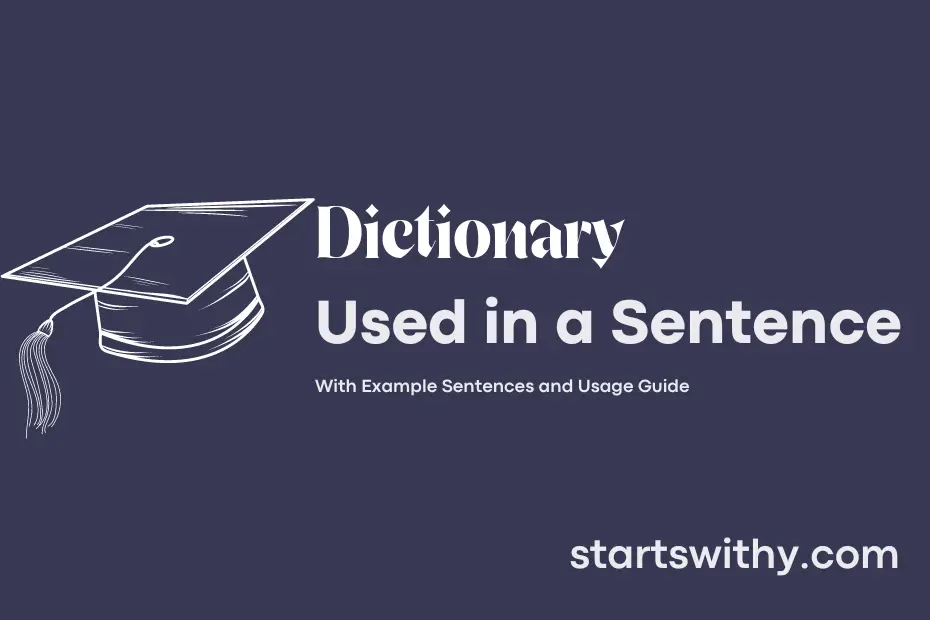Have you ever found yourself stumbling over a word’s definition while reading a book or article? That’s where a dictionary comes to the rescue. A dictionary is a collection of words and their meanings, usually alphabetically organized for easy access.
With a dictionary at your fingertips, you can quickly look up unfamiliar words and expand your vocabulary. It provides insight into the proper usage of words and helps you communicate more effectively. Whether you’re a student, writer, or simply a lover of language, a dictionary is an invaluable tool for understanding and mastering the richness of words.
7 Examples Of Dictionary Used In a Sentence For Kids
Here are 7 easy short sentences:
- Dictionary is a book with many words and their meanings.
- I use a dictionary to find the meanings of new words.
- My teacher says we should use a dictionary to learn new words.
- I keep my dictionary on my study table.
- The dictionary helps me understand difficult words.
- I like to look at pictures in the dictionary.
- My parents bought me a new dictionary for my birthday.
14 Sentences with Dictionary Examples
- Dictionary is an essential tool for college students to look up unfamiliar words and their meanings.
- Make sure to carry a dictionary with you to the library for reference while studying.
- When writing essays or reports, it’s helpful to use a dictionary to ensure proper spelling and grammar.
- Many professors recommend using a bilingual dictionary to aid in understanding complex concepts in different languages.
- Online dictionaries are convenient for quick searches while working on assignments.
- As you advance in your studies, consider investing in a specialized dictionary related to your field of interest.
- Group study sessions can be more effective when each member brings a dictionary to clarify doubts together.
- It’s a good idea to bookmark online dictionaries for easy access during virtual classes.
- Take advantage of mobile apps that offer offline access to dictionaries for studying on-the-go.
- Before attempting to translate texts in a foreign language, consult a reliable dictionary for accurate meanings.
- When preparing for exams, create a list of key terms to cross-reference in the dictionary.
- Consider purchasing a pocket-sized dictionary for quick reference during exams and quizzes.
- Utilize the glossary section of textbooks in conjunction with an external dictionary for comprehensive understanding.
- Explore advanced features in digital dictionaries such as pronunciation guides and word origins to enhance your vocabulary.
How To Use Dictionary in Sentences?
To use a Dictionary in a sentence, start by choosing a word that you want to define or elaborate on. For example, if you want to use the word “happy,” you can look it up in the dictionary to learn more about its meaning, pronunciation, and usage.
Next, read the definition provided in the dictionary to understand the word’s meaning. This will help you grasp how the word can be used in a sentence. For instance, the dictionary might define “happy” as feeling or showing pleasure or contentment.
After understanding the meaning, construct a sentence that incorporates the word “happy” in the appropriate context. A sample sentence could be: “She was happy to see her old friend after many years.”
Ensure that the sentence makes sense contextually and grammatically. It should clearly express the meaning of the word “happy” based on the information you gathered from the dictionary.
Remember to pay attention to the word’s part of speech, any alternate meanings, and examples of usage provided in the dictionary. This will expand your understanding of the word and how it can be effectively used in sentences. Practicing with different words from the dictionary will improve your vocabulary and written communication skills.
Conclusion
In conclusion, the examples of sentences with the keyword “dictionary” illustrate the use and versatility of this essential tool in everyday language. Whether looking up a new word’s definition, exploring synonyms and antonyms, or understanding pronunciation, dictionaries serve as valuable resources for improving vocabulary and communication skills. Additionally, sentences incorporating the word “dictionary” highlight how it aids in language learning and ensures accurate and effective communication by providing comprehensive explanations and guidance on word usage.
By familiarizing oneself with sentences including the keyword “dictionary,” individuals can appreciate the significance of this reference material in enhancing linguistic proficiency and promoting clear and concise expression. Utilizing dictionaries not only expands one’s linguistic knowledge but also fosters a deeper understanding of different words and their nuances, ultimately enriching communication and facilitating effective language use.



